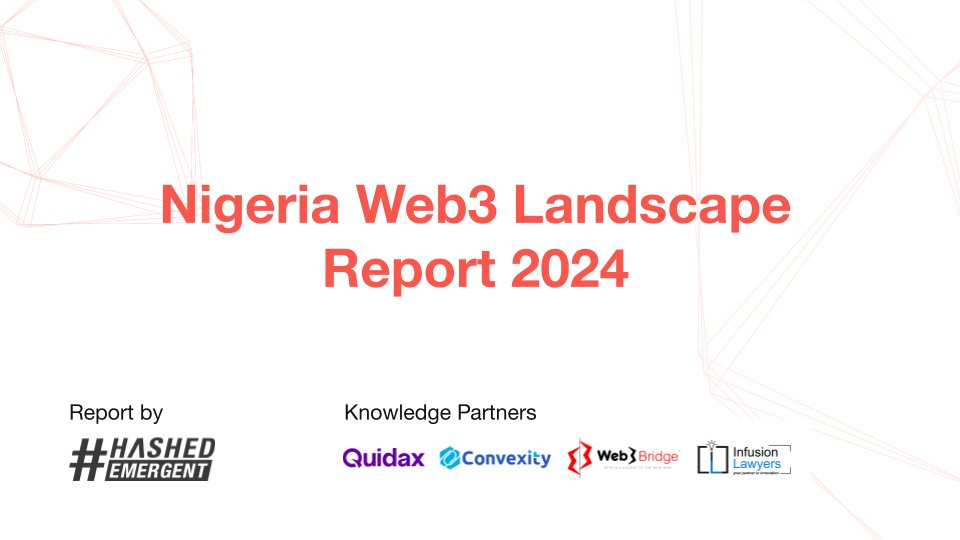In a report released this week, Hashed Emergent, a venture capital firm focused on emerging markets, unveiled the 2024 Nigeria Web3 Landscape, offering deep insights into the country’s blockchain ecosystem. The report, developed in collaboration with ecosystem leaders including Quidax, Convexity, Web3bridge, and Infusion Lawyers, captures Nigeria’s ascent as Africa’s leading Web3 hub.
With over 80 Web3 startups raising more than $130 million, and Nigeria contributing 3% of new global Web3 developers, the findings spotlight a thriving, youth-driven innovation economy increasingly embedded into real-world systems, both public and private.
“Nigeria’s momentum in Web3 adoption will not only shape the future of digital innovation locally but also serve as a catalyst, leapfrogging Africa to the forefront of the global Web3 economy,” said Tak Lee, CEO and Managing Partner at Hashed Emergent.
Nigeria’s Web3 Funding Surges Despite Early-Stage Focus
The report reveals that Web3 startups in Nigeria raised $20 million in 2024 alone, with funding concentrated in infrastructure ($11M) and financial solutions ($7M), a sharp increase from $2M in the prior year.
Unlike the mega-rounds of past cycles, 2024 saw early-stage capital flow through ecosystem grants, Layer 1/Layer 2 protocol programs, and community-driven networks.
Notably:
- Stablecoin adoption accelerated across remittances and inflation-resilient tools.
- Entertainment and gaming sectors saw a funding dip—from $17M in 2023 to just $2M in 2024.
- SocialFi and NFT gaming remain hotbeds of innovation, even as capital consolidates around infrastructure.
A 1.1 Million-Strong Developer Base Driving Innovation
One of Nigeria’s standout advantages is its developer pipeline. In 2024, the country recorded a 28% YoY increase in developers, reaching 1.1 million total. Of these, Web3 developers account for 4% of all new entrants globally, making Nigeria the top contributor in Africa.
Key insights:
- 86% of Web3 developers are under 27 years old
- Over 50% joined the space in the last 12 months
- Most learned via grassroots programs like Web3bridge, Web3Ladies, SuperteamNG, and ecosystem bootcamps from Solana, Base, and Starknet
- 41% work as freelancers, while only 15% hold full-time Web3 roles
- Compensation: 45% receive stablecoins, 31% get paid in ETH, BTC, or SOL
The rise in freelance and bounty-driven work is also bridging global opportunities with local talent, helping offset compensation disparities with their peers abroad.
Web3 Goes Beyond Trading: Real-World Use Cases Take Root
Nigeria is evolving from speculative trading to practical blockchain applications. In 2024, it ranked #2 globally for crypto adoption, receiving $59 billion in crypto value, with stablecoins accounting for $24 billion, surpassing Bitcoin usage on centralized exchanges.
According to the report, blockchain is quietly transforming Nigeria’s public infrastructure, with real-world deployments in:
- Land registries
- Education records
- Healthcare systems
- Digital identity verification
These are not experimental pilots but operational systems, designed to improve transparency and public trust. A particularly transformative application is blockchain-backed point-of-sale infrastructure used by over 50 million Nigerians, demonstrating widespread backend integration.
Regulation in Flux: Between Momentum and Mistrust
While Nigeria’s Web3 landscape is booming, the regulatory environment remains fragmented. The Central Bank of Nigeria (CBN) lifted its 2021 crypto restrictions in December 2023, allowing banks to support licensed Virtual Asset Service Providers (VASPs). The Securities and Exchange Commission (SEC) also introduced the Accelerated Regulatory Incubation Program (ARIP) for VASP onboarding.
Yet contradictions persist:
- The Nigerian Communications Commission (NCC) blocked access to platforms like Binance and Coinbase, despite SEC’s approval of local platforms such as Quidax.
- Ongoing challenges include:
- Lack of unified legislation
- Overlapping mandates between SEC, CBN, and NDIC
- Unclear regulation for DeFi, DAOs, and NFTs
- Lack of unified legislation
Despite this, industry associations such as SiBAN, VASPA, and FintechNGR are driving dialogue toward a more coherent framework under the Investments and Securities Act 2024.
The Road Ahead: Nigeria’s Blueprint for Africa’s Web3 Future
The Nigeria Web3 Landscape Report concludes that the country’s Web3 ecosystem sits at a pivotal juncture, powered by youthful technical talent, rising global partnerships, and increasing public sector adoption.
However, long-term success depends on collaboration between regulators, builders, investors, and global protocols to overcome infrastructure, legal, and institutional gaps.
Hashed Emergent believes Nigeria will serve as a template for scaling Web3 across Africa, aligning with its core thesis of investing early in founders building frontier innovations.
🔗 Read the full report here: Nigeria Web3 Landscape 2024 Report
About Hashed Emergent
Hashed Emergent is the venture capital arm of Hashed, a global Web3 fund. Focused on early-stage investments across India, Africa, and other emerging markets, the firm provides capital, strategic mentorship, and access to a global network of builders and protocols.
With regional roots in Lagos, Bangalore, Seoul, Dubai, and Singapore, Hashed Emergent drives growth through purpose-built community initiatives that power the next wave of Web3 adoption.















